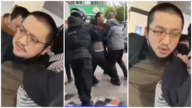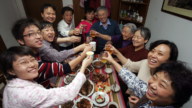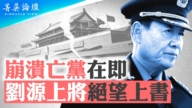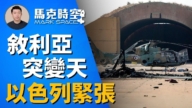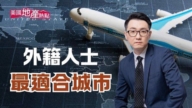【新唐人2013年02月23日讯】美国中文媒体《看中国》,近期编译了《维基解密》公布的一份电报,这份电报是在2009年由美国驻京使馆发往华府,内容详细描述了内蒙古呼伦贝尔市党委书记曹征海向领馆官员炫耀,他如何成功的从中央“刺激经济计划”资金中获得大量投资,从而维持了呼伦贝尔的高增长率,以及他日常如何为官。请看报导。
这份电文显示,2009年5月12号,曹征海与领馆官员共进了晚餐。
曹征海在晚宴上说,他不顾2008年的全球金融危机,2009年继续为呼伦贝尔市制定了GDP增长率18%、政府收入增长20%的目标。而从中央政府“经济刺激计划”中获取资金,则是维持呼伦贝尔经济增长率的重要组成部分。
曹炫耀说,他亲自为呼伦贝尔市从中央获得了8亿元人民币,而与呼伦贝尔城市规模相当的城市,平均只拿到这个数目的1/3。
他表示,中共一宣布“刺激经济计划”的第二天,他就到了北京,并亲自去国家发改委,拿出了呼伦贝尔市的基础设施项目列表。曹还强调了他们的驻京代表在游说中起到重要作用。
中国经济学家茅于轼:“问中央要钱的办法,这个事不能推广的。大家都问中央要钱,那不是开玩笑吗?中央的钱哪来的,请问?天上掉下钱来还可以,天上掉不下来钱,中央的钱就是全国人民的钱,你问全国人民要钱什么理由啊?”
独立评论人士张健认为,去北京跑关系、拉支持,不是民主国家官员所能理解的,把这种不正当行为拿出来炫耀,只能表明中共官场的黑暗。而搞这种浮夸的GDP,与当年的亩产3万斤是一样的。
独立评论人士张健:“他跟美领馆表扬,是完全出于他的炫耀,他这个市委书记多么能干,他根本不知道这是无耻,更不知道他这种行为是犯罪。这是中国官员素质决定的,是中共体制造成了中共官员就是有如此的素质。”
曹征海还描述了他日常如何工作,他说:作为党委书记主要是与官员会谈、出去视察、欢迎来访的内蒙古及中央级官员。
曹说,夏季那几个月,来呼伦贝尔的访客源源不断,既为公差也为休闲。他必须亲自迎接与接待任何来访的副部级或副部级以上的领导。而喝酒是党员干部的“基本技能”。
电文还提到,在“北京人民大学”读大四金融专业的曹征海儿子,也参加了晚宴。他质疑父亲在基础设施中如此花销是否明智﹖并指出回报可能会非常低。曹则驳回了他的说法。
曹征海说:“领导的孩子们,往往是走两个极端,要么非常有才华,要么完全无能。”他希望他儿子成为前者,所以每个月只给1000元人民币做花销,不娇惯。
曹指出,我拿起电话就可以让儿子在任何他想去的地方得到一份工作,但他最终必须证实自己。
张健:“他可能也看到了很多富二代、官二代就因从小被父母娇生惯养,长大以后给家长惹是生非,搞出很多自己的问题,把自己的青春、或把整个人生都毁掉了,他也许从内心深处渴望他孩子有所转变,渴望他孩子不跟他一样。”
此前,有多家媒体报导,中国部级以上官员(包括已退位)的第二代,75%拥有美国绿卡或公民身份,第三代拥有美国公民身份者更达到91%以上。
曹征海带儿子见领馆官员是想加入移民大军,或是让他学习美国的先进管理方法,外人不得而知。
采访/刘惠 编辑/宋风 后制/钟元
WikiLeaks: City CCP’ Secretary Boasts to US Embassy
The US-based Chinese media Chinagaze.com recently
reported about a telegram released by WikiLeaks.
The telegram was sent by the embassy of United States
in Beijing to Washington.
It contained the words of Cao Zhenghai, CCP (Chinese
Communist Party) secretary of Hulunbuir, Inner Mongolia.
Cao told the embassy officials about how he successfully
obtained a great deal of funding from the CCP’s central government as part of its “economic stimulus plan.”
Cao boasted about how he maintained the city’s
high economic growth rate by doing this.
In addition, he also described his daily life
as a city’s party secretary during the conversation.
According to the telegram, Cao Zhenghai had dinner
with US embassy officials on May 12, 2009.
At the dinner, Cao talked about how he set the city’s goal
in 2009 to have 18% GDP growth rate and 20% revenue growth rate despite the global financial crisis in 2008.
To achieve this goal, winning funding from the central
government’s “economic stimulus plan” became a key step in maintaining the city’s high economic growth.
Cao particularly boasted about how he obtained
800 million Yuan from Beijing for the city of Hulunbuir.
In comparison, other cities of similar size only got
one third of that number on average.
Cao said that he arrived in Beijing the next day
after the CCP announced the “economic stimulus plan.”
He went to National Development and Reform Commission,
showing them a list of infrastructure projects in Hulunbuir.
Cao also stressed, the representative of the city’s Liaison
office in Beijing had played an important role in the process.
Mao Yushi, Chinese economist: ”Asking money from
the central government is not a recommendable act.
What will happen if everyone does that? Where does
the central government collect its money from?
It will be great if their money fall from the sky,
but that is not the case.
The central government’s funding is from all Chinese people.
Why should you ask for money from our people?”
Independent political commentator Zhang Jian remarked,
it is hard for democratic officials to understand
how visiting the capital and connecting with officials there
can become an important part of their job.
Boasting about such improper acts can only reveal
how dark the CCP’s politics are.
In addition, producing a pompous number of GDP
regardless of anything else is the same as boosting the grains’ per-acre productivity during the Great Leap Forward.
Zhang Jian, independent political commentator: ”He told
the story to US embassy officials to boast about his work.
He intended to show off how capable he is, but he has
no idea that his act is not only shameless, but also should make him feel guilty.
This shows how bad Chinese officials are,
and this stems from the CCP’s dictatorship regime.”
Cao Zhenghai also talked about his daily work life too.
Cao said most of his work as a party secretary is to meet
with other officials, making inspection visits, and receiving people from the central government.
Cao revealed that, “visitors” regularly come
to Hulunbuir during Summer, both for job or relaxation.
So he has to receive visiting vice-ministerial level or higher
officials, adding, drinking is a ‘basic skill’ for all CCP cadres.
The telegram mentioned that Cao’s son, then a senior
at Renmin University of China, also attended the dinner.
He questioned his father if it is good to spend so much
funding on infrastructure projects as the return may be low.
However, his suggestions were rejected by his father.
Cao Zhenghai remarked that the children of party cadres
usually are one of the two extremes.
They are either very talented,
or are completely incompetent.
Cao expected his son to be of the former, thus he only
gave him 1000 Yuan a month, and didn’t want to spoil him.
Cao said, he could easily get his son any position he likes
just by making a call, but he wants his son to prove himself.
Zhang Jian: ”Probably he observed that many children
of rich people or officials had been spoiled by their parents.
They always brought troubles to their family after
growing up and destroyed their youths and future life.
Perhaps he truly expects his child to make some changes
and have his own life.”
Many media previously reported that 75% of the children
of upper Chinese officials (including retired ones) own US green card or citizenship.
Among the third generation,
over 91% are US citizens.
Cao brought his son to the dinner with US embassy officials.
Did he want him to emigrate, or to learn the advanced methods of management from the United States?
The answer can be hardly known by outsiders.


